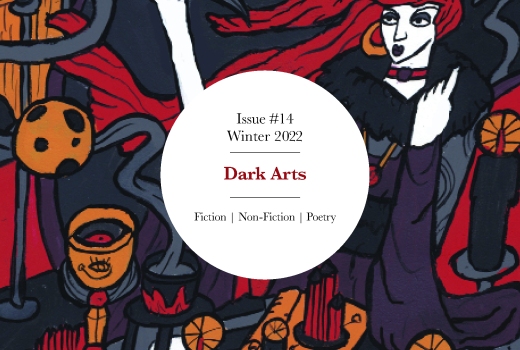
When daily news everywhere reeks of self-serving political machinations, it’s enough to make readers wish for a little black magic of their own: What spell could oust a buffoon from Number Ten (though perhaps, frustratingly, simply to be replaced by yet another toad)? What incantation might block an ex-president from the White House forevermore?
Some of the contributors to this winter’s Dark Arts edition have inspiring suggestions, if only in the realm of fantasy. Emma Levin opens the issue with an imaginative reversal of the frog prince myth, “Moments Recalled in the Seven Minutes Before the Police Arrive”. Capitalists – and anyone who enjoys living on the planet – might do well to take note of the consequences in Judy Birkbeck’s allegorical “The Landowners”. In “Green Beans Are Valid”, Annie Power offers a satirical take on the Orwellian ideology police. Indebted to Donna Tartt’s The Secret History, Max Marioni follows yearning for belonging through to the bitter end in his tale about a student secret society, “The Laurel Wreath Club”.
Some of the issue’s most compelling work took the theme quite literally, moving away from the realm of enchantment into the world of painterly arts. The artist in Lauren du Plessis’s story, “Entropy”, finds such inspiration in astronomy at her mountaintop fellowship that she becomes her work as much as any painter can. In “The Black Place, 1944”, Robert Herbst channels Georgia O’Keefe’s experience in the New Mexico desert, where she created many of her famous paintings. The title of his story nods to some of O’Keefe’s most mesmerising dark art.
The outcomes of dark arts in war are often less positive, as Greta Hayer shows in her historical fiction “Tusk”, about an elephant handler and his giant charge in battle. Elizabeth Hosang’s malevolent “Fixtures” are much smaller, but no less potent, in the very different setting of a gnome-ridden house in suburban Canada.
To lift the spirits – as well as unsettle them – Lisa Farrell closes the issue with her entertaining piece about a rather too effective magician in her story “The Last Act”. Bewitching verse from Alicia Hilton, Jeff Gallagher, James Hancock, Nina Murray and Ceridwen Hall studs the edition, interspersing the prose with poetry on black magic, feminist revisions, challenging creativity, and the magic of science. The issue’s featured poem, Dominic Baur’s “Status Update” (winner of Shooter’s 2021 Poetry Competition), weaves together layered allusions and linguistic associations to conjure a strong sense of underlying narrative. (Both “Status Update” and runner-up Isabella Mead’s poem “Great Aunt Audrey” are available to read here.)
Also online is a new monthly project, Shooter Flash, for those who enjoy even shorter stories than the ones appearing in the magazine. The competition accepts submissions on a rolling basis, with cash prizes, online publication each month, and an annual anthology of the winning pieces that will go out to all of Shooter’s subscribers at the end of each year. The winning stories have been posted online since the inception of Shooter Flash a few months ago – please enjoy these punchy pieces on the website via the link above and, if you’re a writer of miniature masterpieces, go ahead and send us your work!
To order a copy of the Dark Arts issue or to subscribe to Shooter, please visit the Subscriptions page.
